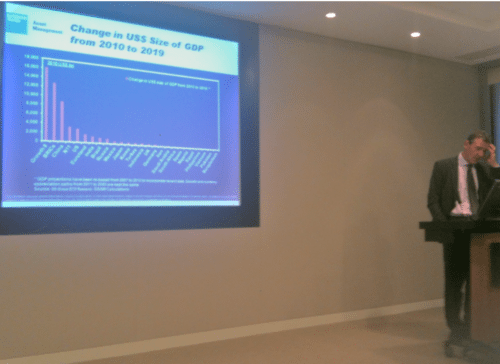
Just tweeted to our friends in the #OccupyLSE group – that’s Occupy the London Stock Exchange (LSE) for those who are not aware of the protest outside the LSE at St Paul’s – that I attended a meeting at the London Stock Exchange this morning.
Yes, I occupied the LSE!
Well, just for an hour in order to hear the thoughts of one Jim O’Neill, Chairman of Goldman Sachs Asset Management.

Jim is the man who coined the term BRICs for the growth countries of Brazil, Russia, India and China ten years ago (his paper was published in November 2001).
Since then everyone has taken the success story of China as read, although it has also been noted that the Brazil, Russia and India growth story also came true.
Now, ten years later, Jim was asked the question by the LSE: “Do BRIC countries still need the West for growth or is the reverse now true?”, and this was the theme of his presentation.
Here’s my spin on his talk (this is not a direct transcription therefore):
The question “Do BRIC countries still need the West for growth or is the reverse now true?”, couldn’t be more apt after the G20 meeting in Cannes last week. In fact, I would claim that this is the most important question facing global economies and leaders today.
And my answer is yes, the reverse is true.
The West has been the most challenged since 2008 as their deleveraging crisis has been with them ever since, and the BRICs are an ever increasing part of the solution.
That being said, the BRICs are living in the same planet as the rest of us and cannot let the West completely implode. For example, as we watch the troubling worlds of Greece and increasingly Italy, the BRICs are seeing more and more impact.
This is especially key for London, in its role in global finance, and is illustrated by the interesting events taking place a few yards away outside St Paul’s Cathedral (where the occupy LSE movement is demonstrating), which means it is very important that all of us involved in business and finance get a bit more objective about the issues being discussed in public forum these days.
Over the last decade the nominal increase in GDP amongst the BRICs has been greater than any other group of countries, apart from the G7.
This is difficult for people of my generation to see or accept, because it is new, although younger people get it far more easily.
Maybe this is because older people find it hard to adapt or change.
During the last decade, the GDP of G7 increased by $11 trillion.
Meanwhile, the Growth8 as I call them – the BRICs plus Indonesia, Vietnam, Mexico and Turkey – increased by a similar amount.
These countries are therefore so economically important that it’s rather sad and stupid that people still call these countries “emerging markets” when they have now emerged, and are contributing so much to growth and global markets. We should call them something else, which is why I choose to call them the Growth8, as opposed to other countries which are emerging markets.
BRICs represent 80% of the Growth8’s $11 trillion growth in the last decade.
The ‘C’ in particular – China – has seen its GDP increase faster than the USA in the last decade.
Another example is Brazil, which has seen GDP increase faster than Germany, Japan and the UK.
From 2010 to 2019, the Growth8 will again rise faster, with China still leading the way.
BRICs will see GDP growth of over $12 trillion of the $16 trillion rise in the Growth8, with China contributing around $8 trillion, or half of that GDP growth. This assumes an 8% average growth rate in their economy, so it assumes China’s growth will slow down.
However, if you look at the figures, the USA will only grow about $3 trillion in GDP by comparison, and Euroland by under $2 trillion.

In these figures, you would need a magnifying glass to see where Greece would sit in the global economy. It’s not big enough to matter.
For example, China will grow by the equivalent of three Greece’s this year – it creates a new Greece GDP size every four months.
Unfortunately that is not the case with Italy.
Looking to the future, the global share of GDP in 2020 will be 41% for the G7; and 35% for the Growth8. Of these, 27% of global GDP will be with the BRICs; 19% with the USA; 17% for China; and 16% for the whole of Euroland!
So during the next decade, the BRICs will be bigger than the USA.
This is important change, as the G20 and IMF are already changing their thinking about the BRICs.
For example, the IMF said at last week’s G20 meeting that it is going to review its Special Drawing Rights (SDR) basket of currencies before 2015, when it was next scheduled for review.
This implies that the Remnimbi (RMB) will be brought into the SDR basket before 2015 because China has moved far closer to full convertibility of their currency sooner than expected, which is incredibly important for everyone in finance, whether you invest in China or not.
This means that debt or equity issued in Chinese RMB becomes normal, which is infinitely more important than what’s going on in terms of Greek and European politics.
For example, when we berate others about their fiscal affairs we have to be careful as, when you look at the budget deficits and government debt, it is clear that this not a sovereign debt crisis.
The gross government debt, as a percentage of GDP, in particularly high in the UK (85%), USA (100%) and Japan (233%) are far worse than in the Eurozone, but their governments still have highly rated sovereign debt.
So the Eurozone issue is more a question of revealing the issue of the weakness of the European Economic & Monetary Union (EMU), rather than a question of sovereign debt.
And if you look at debt in the Growth8, the gross government debt as a percentage of GDP is under 25% for many.
This is why these economies are so key to the future and is illustrated by retail sales.
Retail sales since 2007 have dipped significantly in advanced economies but, in growth and emerging markets, are going up rapidly.
This is why German exports in the last four years have seen the biggest rise in sales to China, India and Russia. By 2012, Germany will be exporting more to China than their neighbour France, which is a real shock.
This demonstrates why the BRICs are now independent of the West and the West needs them far more than they need us.
But the BRICs are not some homogenous area or singular market.
Two are democracies and two are not, and their wealth is very different. Brazil and Russia average around $15,000 a head; China $5,000; whilst India is under $2,000; so they are not similar in terms of wealth or politics. Equally, they differ in content with two commodity producers and two importers, so they are not a region together.
The fact that they now meet as a group annually however is a symbolic move to Western leaders for change in economic governance, and to have these guys at the centre of it.
For example, the G20 is way too big and ugly, so we need a new G7 or G8, of which the BRICs and China will form a key part. For the UK and Canada that’s tough as, in terms of their size of GDP, it makes you wonder what they’re doing there.
The real topic now is what’s happening to Chinese inflation.
It should get under 4% next year, which will be massively important as it will stop China’s tightening of monetary policy and will help the global economy as a result.
We should also note that 2020-2029 might be India’s decade.
China’s demographics will create a turndown and growing anywhere near 10% per annum will be tough a decade from now.
India has great demographics however, with India’s working population increasing by the size of the total USA population in a decade.
Finally, political instabilities are a factor in this outlook.
We have a Goldman Sachs Growth Environment Score (GES) that looks at 13 variables related to the sustainability of growth and productivity, and India scores the lowest of the BRICs on this score.
So when people ask me if I was mistaken about Russia being in this list, I respond by saying I’d take the ‘I’ out of BRICs before the ‘R’.
India is challenged in terms of sustainable growth due to government finances and the lack of a credible framework for economic policy. They also have many other issues of corruption and indecisiveness, which means that they can conceptually be a leader by 2020 or after only if they address these challenges first.
Chris M Skinner
Chris Skinner is best known as an independent commentator on the financial markets through his blog, TheFinanser.com, as author of the bestselling book Digital Bank, and Chair of the European networking forum the Financial Services Club. He has been voted one of the most influential people in banking by The Financial Brand (as well as one of the best blogs), a FinTech Titan (Next Bank), one of the Fintech Leaders you need to follow (City AM, Deluxe and Jax Finance), as well as one of the Top 40 most influential people in financial technology by the Wall Street Journal's Financial News. To learn more click here...





















